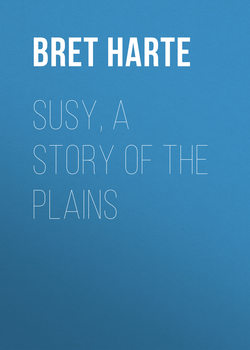Читать книгу Susy, a Story of the Plains - Bret Harte - Страница 4
CHAPTER IV
ОглавлениеAfter the chill of a dewless night the morning sun was apt to look ardently upon the Robles Rancho, if so strong an expression could describe the dry, oven-like heat of a Californian coast-range valley. Before ten o’clock the adobe wall of the patio was warm enough to permit lingering vacqueros and idle peons to lean against it, and the exposed annexe was filled with sharp, resinous odors from the oozing sap of unseasoned “redwood” boards, warped and drying in the hot sunshine. Even at that early hour the climbing Castilian roses were drooping against the wooden columns of the new veranda, scarcely older than themselves, and mingling an already faded spice with the aroma of baking wood and the more material fragrance of steaming coffee, that seemed dominant everywhere.
In fact, the pretty breakfast-room, whose three broad windows, always open to the veranda, gave an al fresco effect to every meal, was a pathetic endeavor of the Southern-bred Peyton to emulate the soft, luxurious, and open-air indolence of his native South, in a climate that was not only not tropical, but even austere in its most fervid moments. Yet, although cold draughts invaded it from the rear that morning, Judge Peyton sat alone, between the open doors and windows, awaiting the slow coming of his wife and the young ladies. He was not in an entirely comfortable mood that morning. Things were not going on well at Robles. That truculent vagabond, Pedro, had, the night before, taken himself off with a curse that had frightened even the vacqueros, who most hated him as a companion, but who now seemed inclined to regard his absence as an injury done to their race. Peyton, uneasily conscious that his own anger had been excited by an exaggerated conception of the accident, was now, like most obstinate men, inclined to exaggerate the importance of Pedro’s insolence. He was well out of it to get rid of this quarrelsome hanger-on, whose presumption and ill-humor threatened the discipline of the rancho, yet he could not entirely forget that he had employed him on account of his family claims, and from a desire to placate racial jealousy and settle local differences. For the inferior Mexicans and Indian half-breeds still regarded their old masters with affection; were, in fact, more concerned for the integrity of their caste than the masters were themselves, and the old Spanish families who had made alliances with Americans, and shared their land with them, had rarely succeeded in alienating their retainers with their lands. Certain experiences in the proving of his grant before the Land Commission had taught Peyton that they were not to be depended upon. And lately there had been unpleasant rumors of the discovery of some unlooked-for claimants to a division of the grant itself, which might affect his own title.
He looked up quickly as voices and light steps on the veranda at last heralded the approach of his tardy household from the corridor. But, in spite of his preoccupation, he was startled and even awkwardly impressed with a change in Susy’s appearance. She was wearing, for the first time, a long skirt, and this sudden maturing of her figure struck him, as a man, much more forcibly than it would probably have impressed a woman, more familiar with details. He had not noticed certain indications of womanhood, as significant, perhaps, in her carriage as her outlines, which had been lately perfectly apparent to her mother and Mary, but which were to him now, for the first time, indicated by a few inches of skirt. She not only looked taller to his masculine eyes, but these few inches had added to the mystery as well as the drapery of the goddess; they were not so much the revelation of maturity as the suggestion that it was HIDDEN. So impressed was he, that a half-serious lecture on her yesterday’s childishness, the outcome of his irritated reflections that morning, died upon his lips. He felt he was no longer dealing with a child.
